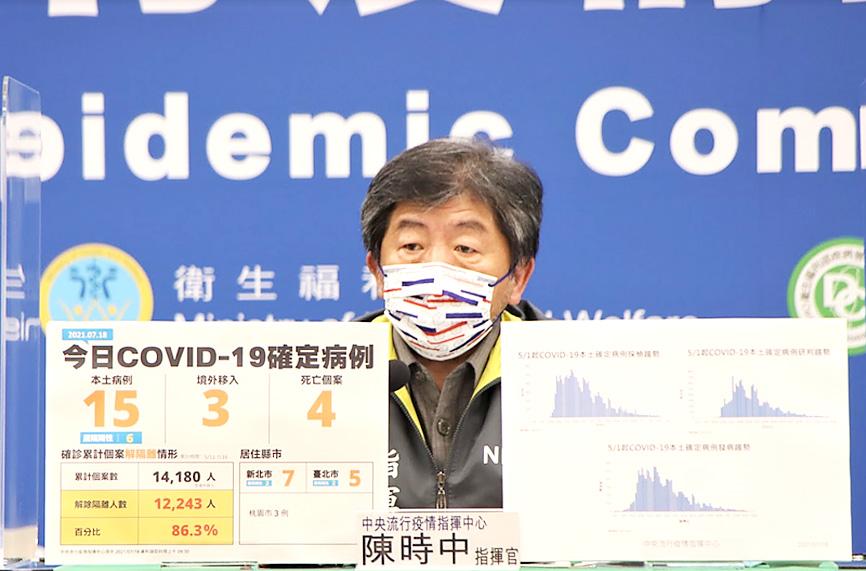The Central Epidemic Command Center (CECC) yesterday reported 15 locally transmitted COVID-19 infections, three imported cases and four deaths.
Six of the local cases tested positive during isolation or upon ending isolation, said Minister of Health and Welfare Chen Shih-chung (陳時中), who heads the center.
The local infections were all reported in northern Taiwan. New Taipei City led the case count with seven infections, followed by Taipei with five cases and Taoyuan with three, he said.

Photo: CNA
The infection sources of nine cases have been identified and six remain unclear, CECC data showed.
Asked if a nationwide level 3 COVID-19 alert could be lowered after Monday next week and whether there might still be hidden transmission chains in Taipei and New Taipei City, Chen said while the trend seems relatively stable, the COVID-19 situation can change quickly, so the center is still working to keep the outbreak under control.
The test positivity rate has dropped from 0.1 percent to between 0.02 and 0.06 percent over the past two weeks, which is much lower than the WHO’s recommendation that test positivity rates remain below or at 5 percent for 14 days before countries or regions reopen, Chen said.

Photo courtesy of Central Epidemic Command Center
About 40,000 to 60,000 tests are conducted daily on weekdays and about 30,000 tests daily on weekends, but the test positivity remains low, he added.
However, Chen said the situation in Taipei and New Taipei City is more complicated, as community spread is still occurring there, so bringing the daily confirmed cases back to zero might be difficult.
Reporters asked Centers for Disease Control Deputy Director-General Philip Lo (羅一鈞) about a news report on Saturday that the CECC on Thursday informed healthcare facilities that fully vaccinated medical workers, hospitalized people and their accompanying caregivers would be exempted from regular mandatory testing.
Lo said the weekly COVID-19 testing of healthcare professionals started in the middle of May, so they have been tested many times.
As many of them have been fully vaccinated, they should no longer be required to undergo weekly testing, he said.
However, if medical workers, hospitalized people and their accompanying caregivers show COVID-19 symptoms, they can still receive a government-funded test in hospital, he added.
The CECC also reported three imported cases, from Spain, the UK and the US.
The four people who died were three men and one woman, aged between 40 and 90.
They all had underlying health conditions, CECC data showed.

The Ministry of the Interior (MOI) is to tighten rules for candidates running for public office, requiring them to declare that they do not hold a Chinese household registration or passport, and that they possess no other foreign citizenship. The requirement was set out in a draft amendment to the Enforcement Rules of the Public Officials Election and Recall Act (公職人員選舉罷免法 ) released by the ministry on Thursday. Under the proposal, candidates would need to make the declaration when submitting their registration forms, which would be published in the official election bulletin. The move follows the removal of several elected officials who were

The Republic of China (ROC) is celebrating its 114th Double Ten National Day today, featuring military parades and a variety of performances and speeches in front of the Presidential Office in Taipei. The Taiwan Taiko Association opened the celebrations with a 100-drummer performance, including young percussionists. As per tradition, an air force Mirage 2000 fighter jet flew over the Presidential Office as a part of the performance. The Honor Guards of the ROC and its marching band also heralded in a military parade. Students from Taichung's Shin Min High School then followed with a colorful performance using floral imagery to represent Taiwan's alternate name

FOUR DESIGNATED AREAS: Notices were issued for live-fire exercises in waters south and northwest of Penghu, northeast of Keelung and west of Kaohsiung, they said The military is planning three major annual exercises across the army, navy and air force this month, with the navy’s “Hai Chiang” (海強, “Sea Strong”) drills running from today through Thursday, the Ministry of National Defense said yesterday. The Hai Chiang exercise, which is to take place in waters surrounding Taiwan, would feature P-3C Orion maritime patrol aircraft and S-70C anti-submarine helicopters, the ministry said, adding that the drills aim to bolster the nation’s offshore defensive capabilities. China has intensified military and psychological pressure against Taiwan, repeatedly sending warplanes and vessels into areas near the nation’s air defense identification zone and across

A Chinese takeover of Taiwan would severely threaten the national security of the US, Japan, the Philippines and other nations, while global economic losses could reach US$10 trillion, National Security Council Deputy Secretary-General Lin Fei-fan (林飛帆) wrote in an article published yesterday in Foreign Affairs. “The future of Taiwan is not merely a regional concern; it is a test of whether the international order can withstand the pressure of authoritarian expansionism,” Lin wrote in the article titled “Taiwan’s Plan for Peace Through Strength — How Investments in Resilience Can Deter Beijing.” Chinese President Xi Jinping’s (習近平) intent to take Taiwan by force